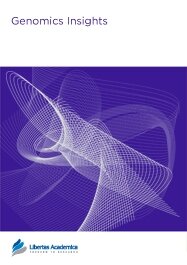

Publication Date: 16 Jun 2009
Type: Original Research
Journal: Genomics Insights
Citation: Genomics Insights 2009:2 11-22

To investigate the general radiation-resistant mechanisms of bacteria, bioinformatic method was employed to predict highly expressed genes for four radiation-resistant bacteria, i.e. Deinococcus geothermalis (D. geo), Deinococcus radiodurans (D. rad), Kineococcus radiotolerans (K. rad) and Rubrobacter xylanophilus (R. xyl). It is revealed that most of the three reference gene sets, i.e. ribosomal proteins, transcription factors and major chaperones, are generally highly expressed in the four bacteria. Recombinase A (recA), a key enzyme in recombinational repair, is predicted to be highly or marginally highly expressed in the four bacteria. However, most proteins associated with other repair systems show low expression levels. Some genes participating in ‘information storage and processing,’ ‘cellular processes and signaling’ and ‘metabolism’ are among the top twenty predicted highly expressed (PHX) genes in the four genomes. Many antioxidant enzymes and proteases are commonly highly expressed in the four bacteria, indicating that these enzymes play important roles in resisting irradiation. Finally, a number of ‘hypothetical genes’ are among the top twenty PHX genes in each genome, some of them might contribute vitally to resist irradiation. Some of the prediction results are supported by experimental evidence. All the above information not only helps to understand the radiation-resistant mechanisms but also provides clues for identifying new radiation-resistant genes from these bacteria.
PDF (737.50 KB PDF FORMAT)
RIS citation (ENDNOTE, REFERENCE MANAGER, PROCITE, REFWORKS)
BibTex citation (BIBDESK, LATEX)

Recently we published a paper describing cloning of a new kinase gene, MLK4, in Genomics Insights. I was impressed by the prompt processing and speed of publication. The comments from the reviewers allowed me to improve the paper significantly. The reviews were scientifically deep and objective, which is very valuable because in many journals decisions to publish or not to publish are very unfair and subjective. I highly recommend that other ...
Facebook Google+ Twitter
Pinterest Tumblr YouTube